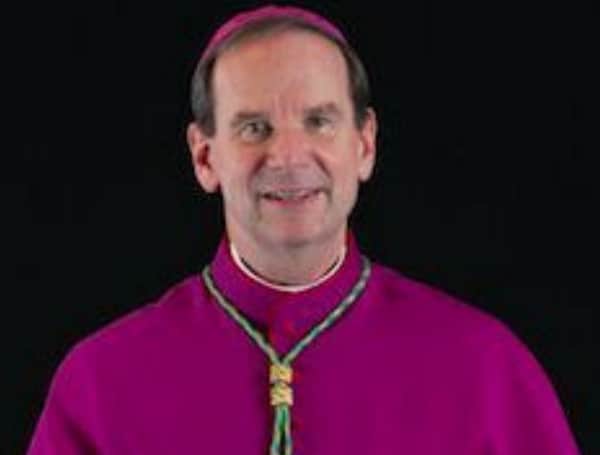A Catholic bishop is pushing back on the left’s dominant sexual narrative of the moment, and taking the now-radical position that sex is determined by biological factors unrelated to how someone feels.
Bishop Michael Burbidge, over the diocese of Arlington, Virginia, a suburb of Washington, recently released an epistle to explain the Catholic position on transgenderism and gender dysphoria. He did so, it appears, to remind Roman Catholics about what their faith requires of them on this issue.
“From medicine, natural law, and divine revelation, we know that each person is created either male or female, from the moment of conception,” Burbidge argues. “Each person is created either male or female,” he adds. “No one ‘is’ transgender.”
In a section of the letter called “The Witness of Science,” he notes:
“We know from biology that a person’s sex is genetically determined at conception and present in every cell of the body. Because the body tells us about ourselves, our biological sex does in fact indicate our inalienable identity as male or female. Thus, so-called ‘transitioning’ might change a person’s appearance and physical traits (hormones, breasts, genitalia, etc.) but does not in fact change the truth of the person’s identity as male or female, a truth reflected in every cell of the body. Indeed, no amount of ‘masculinizing’ or ‘feminizing’ hormones or surgery can make a man into a woman, or a woman into a man.”
In addition to the Bible, natural law and science, the bishop also cites as an authority Pope Francis, often portrayed as an ally of progressive causes, especially in matters of sexuality.
Burbidge opened his long letter by saying that that the efforts to accommodate the “rapid rise” in the number of people “claiming an identity contrary to their biological sex” have invited “tremendous upheavals in our social, legal, and medical systems.”
That, in turn, presents a “serious challenge” for the Church because “it presents a view of the human person contrary to the truth.” He then quotes Francis, who said “In books, kids learn that it’s possible to change one’s sex. Could gender, to be a woman or to be a man, be an option and not a fact of nature? This leads to this error. Let us call things by their names.”
Buridge then goes on to explain three principles that underpin the church’s doctrine on what it means to be human. For example, the soul is individual to the body it inhabits. The distinctions between men and women are such that they form a “complementary union in marriage. Finally, he writes, “A person’s sex is an immutable biological reality, determined at conception. The sexed body reveals God’s design not only for each individual person, but also for all human beings.”
The bishop acknowledges that some people may feel “alienation” in what they perceive their gender to be. This is no sin, he adds, and should be treated with compassion. In fact, he writes of gender dysphoria, “Every individual experiencing this condition should be treated with respect, justice, and charity. …Denigration or bullying of any person, including those struggling with gender dysphoria, is to be rejected as completely incompatible with the Gospel.”
“What is new in our times, however, is the growing cultural acceptance of the erroneous claim that some people, including children and adolescents, are ‘in’ the ‘wrong body’ and therefore must undergo ‘gender transition,’ either to relieve distress or as an expression of personal autonomy,” Burbidge writes.
“Sometimes this involves psycho-social changes: The person asserts a new identity, reinforced by a different name, pronouns, and wardrobe. At other times it involves a medical or surgical change: The person seeks chemical or surgical interventions that alter the body’s function and appearance and even impair or destroy otherwise healthy reproductive organs. At its core, this belief in a ‘transgender’ identity rejects the significance of the sexed body and seeks cultural, medical, and legal validation of the person’s self-defined identity-an approach called ‘gender affirmation.’”
“Culturally,” he notes, “these claims have brought challenges to law, medicine, education, business, and religious freedom. They also raise significant pastoral challenges for both the shepherds and the faithful of the Diocese.”
Those cultural challenges, Burbidge writes, include the abuse of language, including pronouns, which creates a “profound crisis” that encourages Catholics to “speak falsely” about someone’s God-given identity.
The bishop had sharp words for institutional powers that try too mandate such behavior.
“In the broader culture, Catholics may experience significant pressure to adopt culturally-approved terminology. However, in no circumstances should anyone be compelled to use language contrary to the truth,” he writes.
“The right to speak the truth inheres in the human person and cannot be taken away by any human institution. Attempts by the state, corporations, or employers to compel such language, particularly by threats of legal action or job loss, are unjust.”
Burbidge also points out that parents have a heightened duty to safeguard the church’s instruction, as that can be undermined by both unregulated internet use and education in public schools.
“The claim to ‘be transgender’ or the desire to seek ‘transition’ rests on a mistaken view of the human person, rejects the body as a gift from God, and leads to grave harm. The Church does not teach that people who experience gender dysphoria or confusion are immoral or bad,” Burbidge argues.
“At the same time, a person who deliberately rejects his or her given identity or the sexed body and seeks harmful medical or surgical interventions is pursuing a path that is objectively wrong and harmful on many levels. The Church has a special solicitude for those who are suffering and desires to lead them to the truth and to healing.”
Support journalism by clicking here to our GoFundMe or sign up for our free newsletter by clicking here
Android Users, Click Here To Download The Free Press App And Never Miss A Story. It’s Free And Coming To Apple Users Soon
